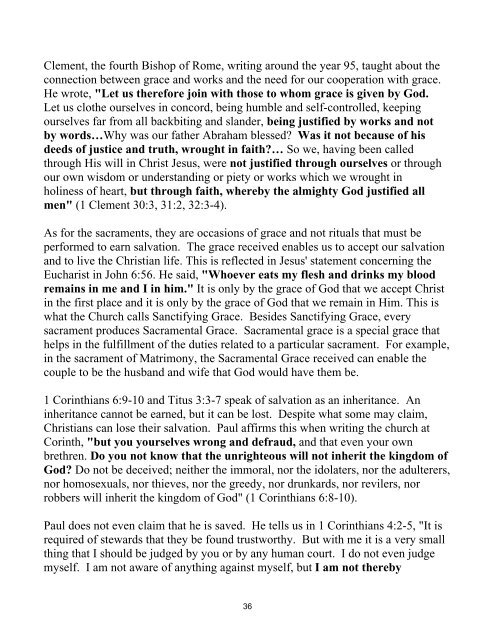Sebastian R. Fama - St. Patrick's Basilica
Sebastian R. Fama - St. Patrick's Basilica
Sebastian R. Fama - St. Patrick's Basilica
You also want an ePaper? Increase the reach of your titles
YUMPU automatically turns print PDFs into web optimized ePapers that Google loves.
Clement, the fourth Bishop of Rome, writing around the year 95, taught about the<br />
connection between grace and works and the need for our cooperation with grace.<br />
He wrote, "Let us therefore join with those to whom grace is given by God.<br />
Let us clothe ourselves in concord, being humble and self-controlled, keeping<br />
ourselves far from all backbiting and slander, being justified by works and not<br />
by words…Why was our father Abraham blessed? Was it not because of his<br />
deeds of justice and truth, wrought in faith?… So we, having been called<br />
through His will in Christ Jesus, were not justified through ourselves or through<br />
our own wisdom or understanding or piety or works which we wrought in<br />
holiness of heart, but through faith, whereby the almighty God justified all<br />
men" (1 Clement 30:3, 31:2, 32:3-4).<br />
As for the sacraments, they are occasions of grace and not rituals that must be<br />
performed to earn salvation. The grace received enables us to accept our salvation<br />
and to live the Christian life. This is reflected in Jesus' statement concerning the<br />
Eucharist in John 6:56. He said, "Whoever eats my flesh and drinks my blood<br />
remains in me and I in him." It is only by the grace of God that we accept Christ<br />
in the first place and it is only by the grace of God that we remain in Him. This is<br />
what the Church calls Sanctifying Grace. Besides Sanctifying Grace, every<br />
sacrament produces Sacramental Grace. Sacramental grace is a special grace that<br />
helps in the fulfillment of the duties related to a particular sacrament. For example,<br />
in the sacrament of Matrimony, the Sacramental Grace received can enable the<br />
couple to be the husband and wife that God would have them be.<br />
1 Corinthians 6:9-10 and Titus 3:3-7 speak of salvation as an inheritance. An<br />
inheritance cannot be earned, but it can be lost. Despite what some may claim,<br />
Christians can lose their salvation. Paul affirms this when writing the church at<br />
Corinth, "but you yourselves wrong and defraud, and that even your own<br />
brethren. Do you not know that the unrighteous will not inherit the kingdom of<br />
God? Do not be deceived; neither the immoral, nor the idolaters, nor the adulterers,<br />
nor homosexuals, nor thieves, nor the greedy, nor drunkards, nor revilers, nor<br />
robbers will inherit the kingdom of God" (1 Corinthians 6:8-10).<br />
Paul does not even claim that he is saved. He tells us in 1 Corinthians 4:2-5, "It is<br />
required of stewards that they be found trustworthy. But with me it is a very small<br />
thing that I should be judged by you or by any human court. I do not even judge<br />
myself. I am not aware of anything against myself, but I am not thereby<br />
36






